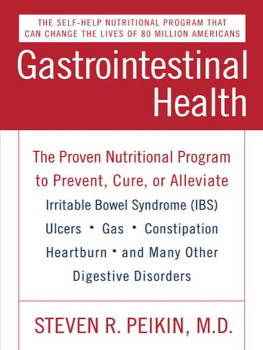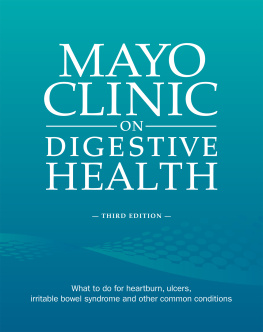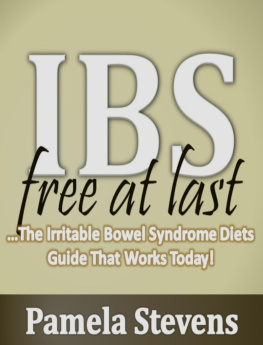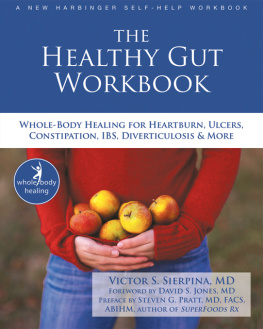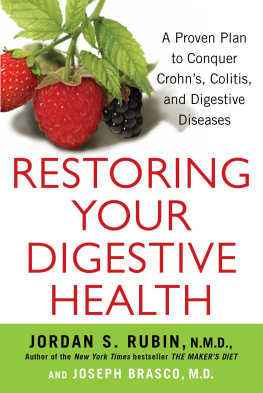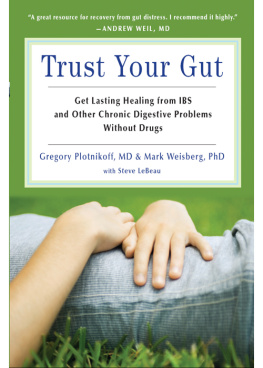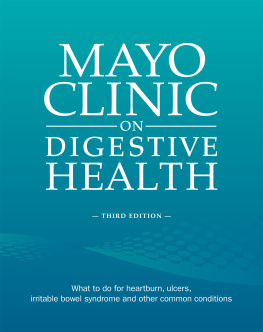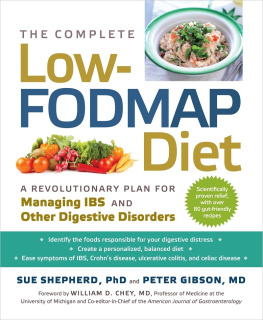To Lori with love
Contents
Gastrointestinal Health
The Self-Help Nutritional Program: A Healing Diet
How the GI Tract Works
What Your Symptoms Mean
Is Your GI Disorder Psychosomatic? The Brain-Gut Connection
Gastrointestinal Problemsand How to Alleviate Them
GERD: Heartburn and Other Symptoms of Gastroesophageal Reflux Disease
Peptic Ulcer Disease and Other Stomach Disorders
Pancreatitis
Gallbladder Problems
Irritable Bowel Syndrome (IBS)
Gastrointestinal Gas
Constipation
Diarrhea
Diverticulosis and Its Complications
Hemorrhoids and Fissures
Inflammatory Bowel Disease
Cancer of the Colon and Rectum
Food Allergies
Stress: The Great GI Aggravator
Quick Fixes with OTC Products
Dietary Supplements, Herbs, and Integrative Health: Beyond the Basics (by Liz Zorzanello Emery, M.S., R.D., C.N.S.D., L.D.N.)
The Self-Help Nutritional Program: The Two-Week Master Program
The Principles Behind the Self-Help Nutritional Program
Increasing Fiber
Lowering Fat
Reducing Lactose
Lowering Spice Content
Reducing Fructose
Reducing Gas-Forming Legumes
Low Calories/High Nutrition
Flag Foods for Fine-Tuning
Smoking, Alcohol, and Caffeine and Digestive Disorders
Weight Considerations
How to Adjust Calories for Your Needs
Losing Weight
Exercise to Control Weight and Improve Digestive Function
If You Need to Gain Weight
Your Gastrointestinal Maintenance Plan
Keeping Track of Your Progress
Your Everyday Cooking
Dining Out
Gastrointestinal-Healthy Recipes
Appetizers and Soups
Entrees: Fish and Seafood
Entrees: Meat
Entrees: Meatless
Entrees: Poultry
Side Dishes: Grains and Starches
Side Dishes: Salads and Vegetables
Breads and Muffins
Breakfast Dishes
Desserts
Miscellaneous
S ince the release of Gastrointestinal Health in 1991, there have been many new and exciting developments in the field of gastroenterology. Most notable is confirmation of the discovery that many diseases of the upper gastrointestinal tract (ulcers, gastritis, stomach cancer) are caused by a bacterial infection. It may surprise some people that almost a third of American adults are currently infected with the bacteria Helicobacter pylori and this may, in part, explain why so many people suffer from upper gastrointestinal diseases. The reader will learn of new ways to diagnose (one which can give you an answer in four minutes using just a drop of blood) and new ways to treat Helicobacter pylori infection.
In the second edition I added a chapter on colon cancer and in the third edition this has been expanded to include many ways to avoid developing colon cancer, the second most-common cause of death in the United States, and how to diagnose it early while it is still curable. I discuss a new blood test that can tell certain individuals who have a family history of colon cancer whether they are likely to develop the disease. A new stool test can predict who has polyps and cancer.
Important information recently has been published about irritable bowel syndrome, the most common gastrointestinal disease affecting young women. New theories on what causes irritable bowel syndrome and the latest ways to improve symptoms of diarrhea, constipation, and abdominal pain are discussed.
Millions of Americans suffer from ulcerative colitis and Crohns disease, and the new edition of Gastrointestinal Health contains an expanded chapter on inflammatory bowel disease. The latest information on combination drug regimens to treat inflammatory bowel disease and dietary recommendations for each stage of ulcerative colitis and Crohns disease have been added.
Many new over-the-counter and prescription drugs have reached the market since 1991. Four new over-the-counter and one new prescription drug have been approved by the Federal Drug Administration (FDA) for the management of gastroesophageal reflux. All but a few people can now be rid of their heartburn by taking medications and following the nutritional advice outlined in this book. Eight drug regimens designed to eradicate Helicobacter pylori have been approved by the FDA since 1991 and are outlined in the chapter on peptic ulcer disease.
Several new endoscopic procedures are included in the third edition. Many are used to treat acid reflux and one (videocapsule endoscopy) involves the swallowing of a pill containing a camera to investigate disorders of the small intestine.
Since 1991, several old drugs have been shown to be useful in treating new diseases. The use of tricyclic antidepressant medication in the treatment of noncardiac chest pain, non-ulcer dyspepsia, and irritable bowel syndrome; high doses of pancreatic enzymes to treat the pain of chronic pancreatitis; better antibiotic regimens to treat patients with Crohns disease and ulcerative colitis, are just a few examples of the great strides that have been made recently in the pharmacologic management of gastrointestinal symptoms.
The third edition of Gastrointestinal Health contains new information on dietary supplements and herbal treatments for those individuals with gastrointestinal problems since many more Americans are treating their symptoms with alternative medicine remedies. In this section Liz Emery, M.S., R.D., has outlined those tinctures, supplements, and probiotics beneficial in treating gastrointestinal disorders. The third edition continues to express the importance of nutritional management for most gastrointestinal problems. The reader is offered the latest up-to-date nutritional recommendations. Meal plans and recipes are included for your convenience.
It was my intention in writing Gastrointestinal Health that the book be practical, useful, and easy to refer to when you or a family member develops heartburn, abdominal pain, diarrhea, constipation, hemorrhoids, or any of the other myriad yet common problems that affect almost all of us from time to time.
Y ou have a problem thats driving you crazy. Stomach pain, cramps or spasms, queasiness, frequent constipation or intermittent diarrhea, heartburnall are signs that something is out of whack with your digestive system. Maybe youve been told you have irritable bowel syndrome (IBS) or colitis, a catch-all term used to describe bouts of severe spasm followed by diarrhea or constipation or both. Perhaps when youre under stress you suddenly double over with stomach cramps and have to race to the bathroom. You might wake up in the mornings with what a patient of mine calls a grungy stomach. Or maybe in the middle of the night you feel acid rise in your throat, waking you out of a sound sleep. Or maybe, like many people who come to me at Cooper Hospital/University Medical Center in Camden and Voorhees, New Jersey, you have been diagnosed with more than one gastrointestinal (GI) problemperhaps diverticulitis and constipation. Your doctor has told you to adhere to a low fiber diet for your diverticulitis but the low fiber content of that diet has aggravated your constipation. GI disturbances often trigger each other, and perhaps the most frustrating part of solving these problems is that whats soothing for one set of symptoms seems to aggravate another.
Virtually everyone, even people with cast-iron stomachs, suffers a bout of gastrointestinal distress from time to time as a reaction to stressful living, erratic diet, or temporary illness. Generally, as the event that triggered the symptom passes, so does the symptom. For many people, however, digestive problems are long-standing, provoked by almost anything, and often unrelieved, or only partly relieved by medication.

